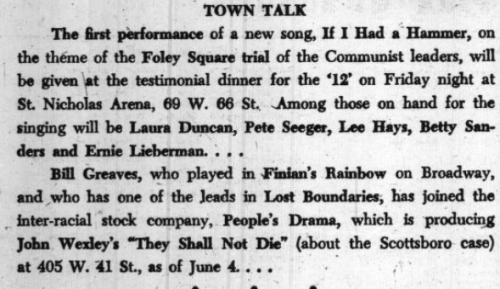Mccarthyism - Tumblr Posts
Song of The Day
"If I Had a Hammer" Aretha Franklin, 1965
"If I Had a Hammer" was first written in 1949 by Lee Hays and Pete Seeger, and featured on the 1950 cover of Sing Out! magazine vol 1 iss. 1. It was written in support of the progressive party. It was first recorded by the Weavers in 1949 and was performed that same year in New York at a dinner for the communist party.

Daily Worker 1949-06-01: Vol 26 Iss 108
This performance of the song and this Newspaper would be used against Pete Seeger in his HUAC Testimony. He was sentenced to a year in prison for 'Contempt of Congress'. Here is an excerpt of the interrogation.
Mr. TAVENNER: My question was whether or not you sang at these functions of the Communist Party. You have answered it inferentially, and if I understand your answer, you are saying you did. Mr. SEEGER: Except for that answer, I decline to answer further. . . . Mr. SCHERER: Do you understand it is the feeling of the Committee that you are in contempt as a result of the position you take? Mr. SEEGER: I can’t say. Mr. SCHERER: I am telling you that that is the position of the Committee. . . . Mr. SEEGER: I decline to discuss, under compulsion, where I have sung, and who has sung my songs, and who else has sung with me, and the people I have known. I love my country very dearly, and I greatly resent this implication that some of the places that I have sung and some of the people that I have known, and some of my opinions, whether they are religious or philosophical, or I might be a vegetarian, make me any less of an American. I will tell you about my songs, but I am not interested in telling you who wrote them, and I will tell you about my songs, and I am not interested in who listened to them. . . .
Unfortunately, Pete Seeger and the rest of the weavers were blacklisted during the Red Scare, meaning that they were not able to publicly perform "If I Had A Hammer", and they were forced to disband in the early 50s.
In the Biography How Can I Keep From Singing, Pete Seeger remarks on this.
"Why was it controversial? In 1949 only ‘Commies' used words like ‘peace' and ‘freedom.'… The message was that we have got tools and we are going to succeed. This is what a lot of spirituals say. We will overcome. I have a hammer. The last verse didn't say ‘But there ain't no hammer, there ain't no bell, there ain't no song, but honey, I got you.' We could have said that! The last verse says ‘I have a hammer, I have a bell, I have a song.' Here it is. ‘It's the hammer of justice, it's the bell of freedom, the song of love."
With few exceptions, the song was dead for 12 years...
Until Peter Paul & Mary covered it in 1962
This song became a top 10 hit song in America! Since then it has been covered over 200 times. It was one of the top 100 songs of 1962 and is still a popular song today. It transcended genre and many many popular artists including Jimmie Rodgers, johnny cash, and the 'Queen of Soul', Aretha Franklin in 1965.
and, as a happy ending, the weavers performed it again in their reunion concert in 1963.
Also, a thing I like about this song is that it seems to be inspired by the John Henry song "This Old Hammer" based on the lyrics and rhythm. The hammer may have killed John Henry, but it can Hammer the way to freedom as well.

Annie Leibovitz Pete Seeger, Croton-on-Hudson, New York 2001
“I have been singing folksongs of America and other lands to people everywhere. I am proud that I never refused to sing to any group of people because I might disagree with some of the ideas of some of the people listening to me. I have sung for rich and poor, for Americans of every possible political and religious opinion and persuasion, of every race, color, and creed. The House committee wished to pillory me because it didn’t like some few of the many thousands of places I have sung for.” Pete Seeger, Statement to the court prior to his sentencing on contempt of Congress charges for his refusal to reveal names of communist or socialist acquaintances before the House Un-American Activities Committee in 1955.